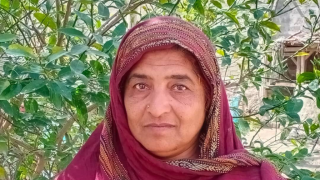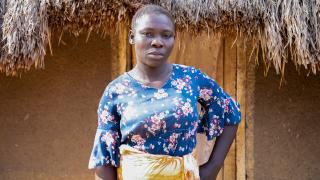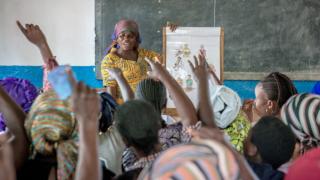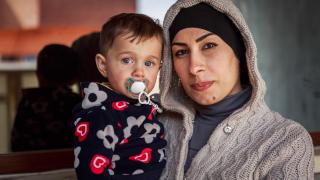The Impact of Conflict on Family Structures & Finances
Stepping into new roles
Conflict doesn't merely shatter physical landscapes; it reshapes the very core of family structures.
As conflict disrupts the traditional fabric of families, women often find themselves thrust into the role of primary caregivers and providers, navigating unique challenges that demand attention and support.
In the turbulent aftermath of conflicts worldwide, we remain dedicated to understanding and addressing the profound consequences on family structures, with a particular focus on women emerging as heads of households.
14% of women we serve report being the heads of their households
Source: Women for Women International programme data, 2022
95% of people in Afghanistan are not getting enough to eat - almost 100% in women-headed households
Source: UN, 2022
7.7x In conflict areas, women are 7.7 times more likely to live in extreme poverty
Source: UN Women
Grappling with loss, uncertainty and new roles
Displacement and loss
According to UNHCR, women and children constitute around 80% of those displaced by conflict, underscoring the disproportionate impact on family structures.
Loss of male family members
The toll of conflict often results in the tragic loss of male family members. Women become the sole breadwinners, grappling with the economic and emotional repercussions of this role reversal.
Economic upheaval
According to the World Bank, conflict-affected countries often experience a 20% reduction in income, placing a significant burden on women as they navigate economic instability.
Meeting basic needs
The World Economic Forum highlights that women in conflict-affected regions often face a wage gap, further exacerbating economic challenges and their ability to provide for their families.
Educational disruptions
UNESCO reports that conflict results in a higher likelihood of girls dropping out of school, compounding the educational challenges faced by women heading households.
Psychological impact
Becoming primary caregivers and providers takes a toll on women's mental health. A study in the Lancet emphasises that women in conflict zones experience higher rates of depression and anxiety.

Sohaila's story
"Culturally, as a widow, it was expected of me to withdraw from public life and rely on the support of my extended family. However, I was determined to take a different path."
Living in a village in Afghanistan, Sohaila is a single mother and business owner - against the odds.
Since losing her husband, Sohaila tells us she has had to defy countless social norms to provide for herself and her children, but it has led to her success. She has gained confidence, defended her rights and kept her children in school.

Suzan's story
"I decided I would never choose a new man over my children."
Suzan has survived conflicts and ongoing violence in South Sudan, but the instability cost her numerous family members, livelihoods and her education.
With the help of our Stronger Women, Stronger Nations programme, she gained the skills and confidence to rebuild.
Resilience and strength amid adversity
The impact of conflict on family structures reverberates deeply, with women emerging as central figures in navigating the challenges of rebuilding and providing stability. Recognising the shifting dynamics and offering targeted support to women as heads of households is essential for fostering resilience and sustainable recovery in the aftermath of conflict.
By joining our Stronger Women, Stronger Nations programme, women receive a monthly stipend and education on how to save and access financial systems. In their groups of 25, they join Village Savings and Loans Associations (VSLAs), through which they meet regularly to contribute small but significant amounts of their earnings to a pooled savings fund, traditionally stored in a lockbox.
In some communities, we have helped women cross the digital divide and start using digital savings schemes. Women in our programme also increase their livelihoods through improved numeracy, financial literacy, vocational and business skills.
Marie Claire is one of the women who has graduated our Stronger Women, Stronger Nations programme in Rwanda. She shared:
Thanks to savings I had and a loan from my VSLA, I was able to purchase 20 sewing machines to start a tailoring business. I employ 20 young women and together we are a local supplier of school uniforms.
We also teach women about their rights and to increase their decision-making power. This helps them to protect themselves, their daughters and other women in their communities against economic abuse - be that on a daily basis in the home, when handing inheritance or land ownership, or otherwise.
Keep reading: Why women in conflict?
In fragile and conflict-affected settings (FCS), education is not just a luxury – it’s a lifeline. Yet girls are 90% more likely to be out of secondary school in these regions (compared with girls in non-FCS), and among the women who enrolled in our Stronger Women, Stronger Nations programme in 2023, only 33% had some level of literacy.
When a girl's education is cut short, it negatively affects the rest of her life, as well as the lives of her future children and her wider community.
War and conflict force people to become displaced form their homes. While women are not necessarily more likely to be displaced in terms of sheer numbers compared to men, there are some specific, gender-based reasons why women may make the impossible choice to flee - and ways in which they may struggle.
In times of war and conflict, women struggle to obtain adequate food, safe drinking water and basic sanitation and healthcare. Women, who are often primary caregivers and the most vulnerable, face unique challenges during these times. They often lose access to contraception, hygienic period products, maternity care and protection from sexually transmitted infections – while facing an increased risk of sexual and intimate partner violence.



